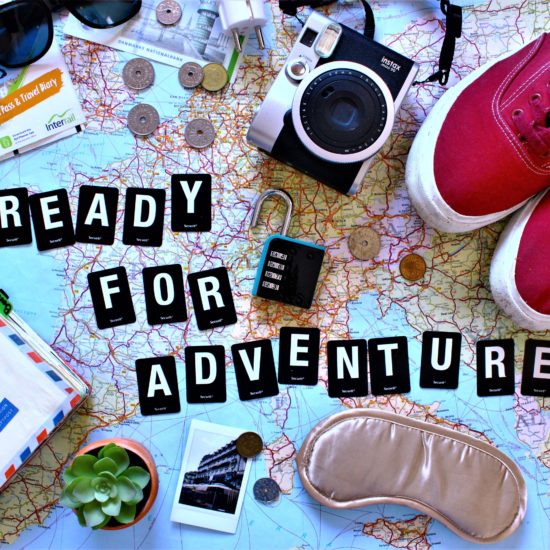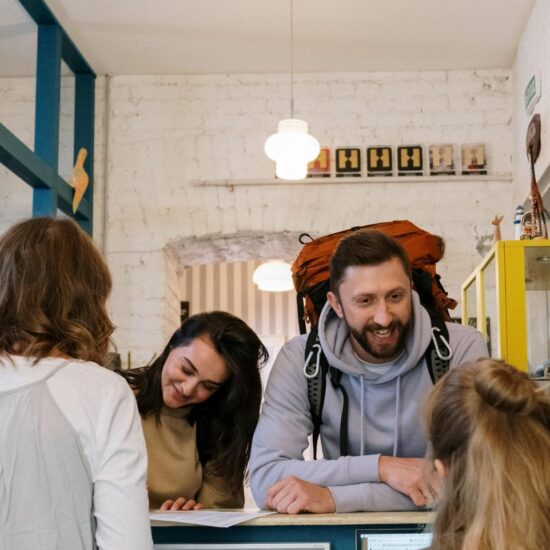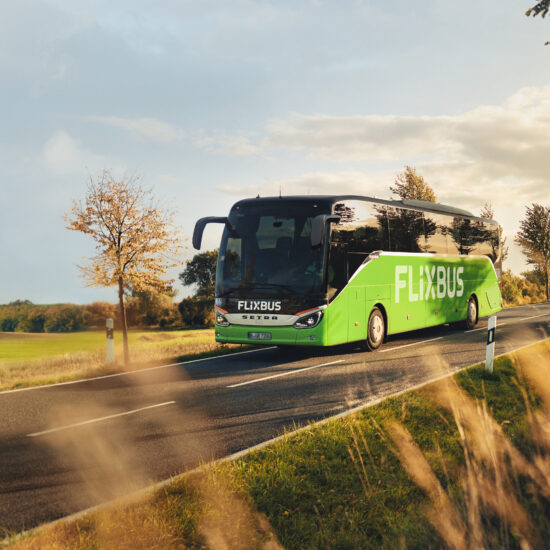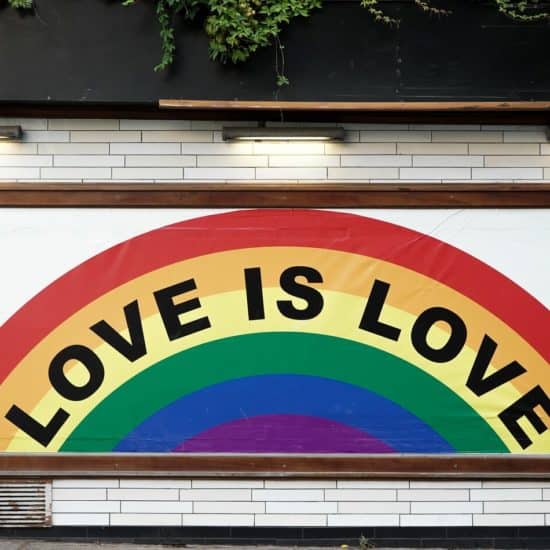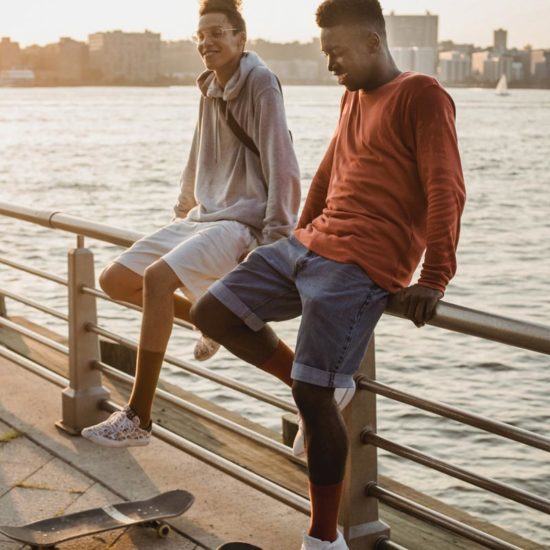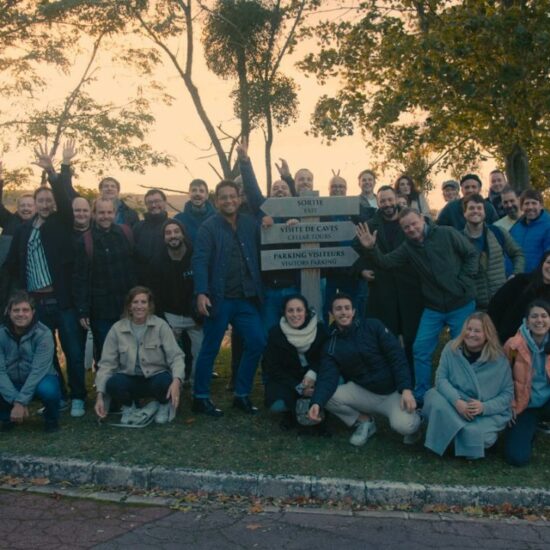We’ve been trying our best to raise awareness for activism and the fight against climate change itself. This change has to happen on multiple fronts. In this article, I got the chance to talk to climate activist and web developer and designer David Jablonski. As well as the Owners of the Restaurant/Cantina A Praça Sintra, a plant-based restaurant for local and seasonal food. When I spoke to them we had the opportunity to learn more about how small businesses and activists fight climate change. I will also highlight the ECO-Wanderer project, our project to promote a more sustainable way of traveling. Keep reading so you can find out how small businesses and activists fight climate change!
A Praça Sintra(Portugal)
How small businesses and activists fight climate change.
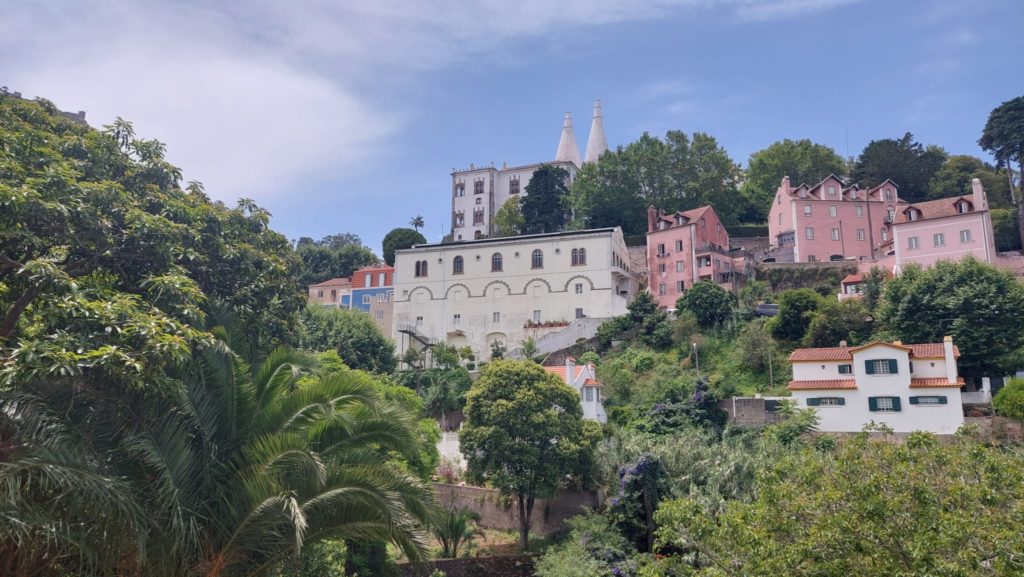
Sintra, Portugal, white building in the center: A Praça Sintra (how small businesses and activists fight climate change)
Just 45 Minutes from Lisbon, lies Sintra. A beautiful old town with many things to do. One of them is to eat at A Praça Sintra, a plant-based restaurant that serves a new menu each day which always consists of local and seasonally grown vegetables. I had the privilege to spend a day in Sintra, try the food, watch them prepare it, and also interview the owner, Graça. I am very excited to share what she told me:
EFH: So how was A Praça Sintra created?
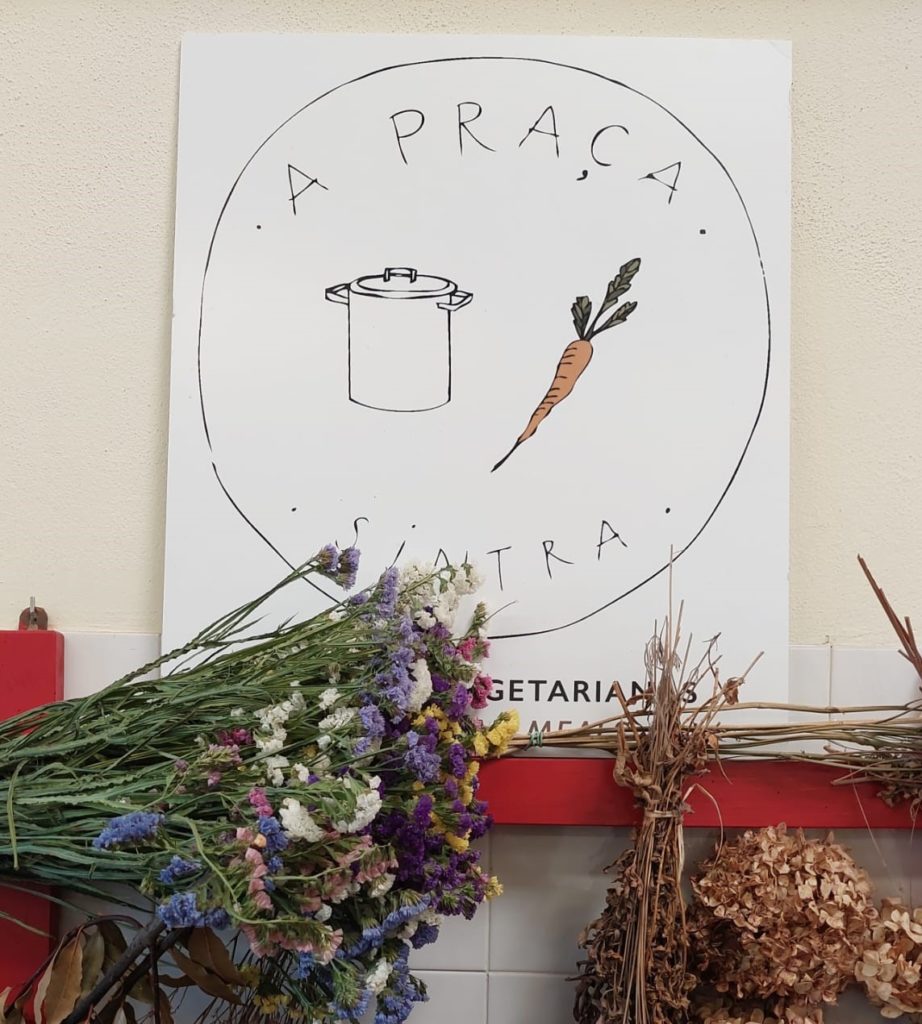
A Praça Sintra Logo (how small businesses and activists fight climate change)
Graça: A Praça Sintra used to be a market, I used to come here to the market with my mom. I have had a connection with the place for a long time. I didn’t live in Sintra for 20 years, and when I came back this place was empty, this is because now there are fewer locals who would use the market, in the center and more tourism. So I decided to create this space, it had good conditions.
I was happy to have the kitchen in the middle of all the tables, and I could not stand the idea of having an isolated kitchen from the customers. I was never a chef, I used to be a lot into horticulture, and thought I would do this for the rest of my days. But opening this restaurant was a great idea in the end. There was only one other vegetarian Restaurant in Sintra when I started. I asked some friends of mine to come and help me. And then in April 2019, we started!
EFH: What inspired you to become a Vegetarian?
Graça: I started being a Vegetarian for the first time when I was 19, I didn’t like the idea of having an animal on my plate. I have also always grown my own Vegetables, I have always had my vegetable gardens. This was a big part of it. It is not just a question of being vegetarian but also a question of the quality of the vegetables that we eat. Especially organic ones and if they were produced by ourselves it is much better. And that’s what I did until I started A Praça, when I started A Praça I had no more time to grow my vegetables. We get our vegetables nowadays fresh from the local market, from our contacts there.
EFH: Beyond just giving people a good meal, would you say that you have a mission with this place?
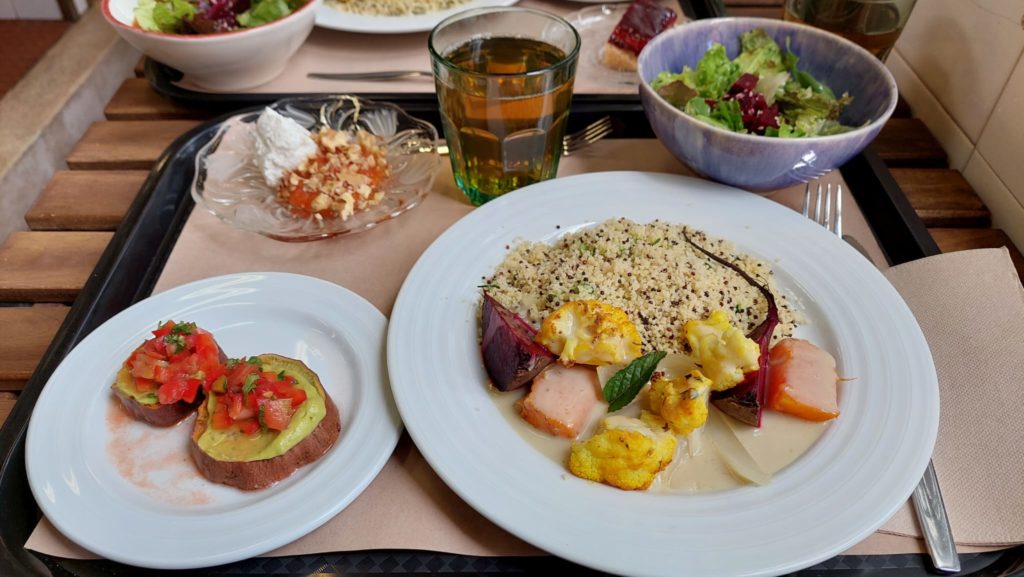
Lunch, at A praca Sintra (how small businesses and activists fight climate change)
Graça: Yes! First of all, is the idea that you can eat very high quality and tasty vegetarian food. Here in Portugal, a lot of people have the idea that Vegetarian food is tasteless, and not very good. In Portugal, people eat a lot of meat. Fish and other meats are eaten all the time. Up north they do it even more. So I wanted them (people) to understand that it is very easy, good, healthy, and tasty to eat vegetarian food. The other point was to have almost zero waste.
The idea was to create a single menu for each day to create no waste. If we have leftovers we take them home. We have a bigger compost bin for vegetables and a small Trashbin which is this size(demonstrates the size of a small box). I am very proud of it because it is really small. I believe that we were successful with that. Most of our Portuguese clients are not vegetarian, they come just because they enjoy the food. Some people say it is the best food they had in Portugal.
EFH: You have spoken about the problem, of meat-eating culture (specifically in Portugal but also applicable elsewhere) can you tell us a little bit more about that?
Graça: Yes, there is a very strange thing about Portuguese food. Even though we have an amazing climate for growing vegetables, we still don’t eat many vegetables. We eat a lot of meat, potatoes, fried potatoes, rice and not a lot of vegetables. Our children are raised without vegetables because their parents assume that they won’t like them. It is stupid! Of course, they will like them if they are well cooked. Vegetables are beautiful, they are colorful, so why not? I think the problem is the parents. They like to give them a steak with some rice.
EFH: So you would say that in order to have a more vegetarian diet in our society it begins with raising children more vegetable-friendly?
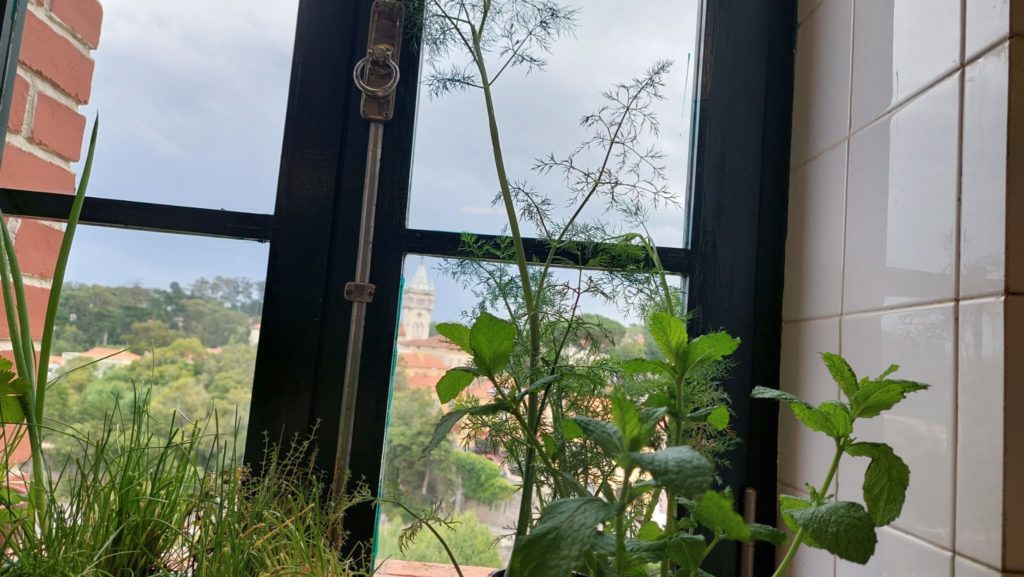
View from the Windows at A praça Sintra (how small businesses and activists fight climate change)
Graça: Yes, I am sure about it. We can see that with some tourists the children eat more vegetables. The problem again is that parents assume that their children will not like our food! I have 3 children, and they all eat vegetables. They are not vegetarian, but they eat mostly vegetarian food.
EFH: Your entire menu is local and seasonal, so everything I eat here is locally grown and in season?
Graca: Yes, so this was the first week we used tomatoes for instance. Because the season is only starting now (June). It is also the first week for these small melons called melon. Two weeks ago we started using peaches, and cherries. Never buy any of these out of season. They are so much tastier and you can taste the difference. In the supermarket, you can get everything all year. I go directly to the local producers and only get products when it is the right time for them.
EFH: So just beyond these differences in taste what other advantages do seasonal and local vegetables bring, for example for the climate?
Graça: If vegetables grow in their season they may not need greenhouses, which means fewer pests, and therefore fewer pesticides to harm the environment. Also, the food is staying local and doesn’t have to be transported much. And vegetables need sun, so if they can grow outside and not in a greenhouse it is much better. Also eating out-of-season vegetables means importing them sometimes from the other side of the world, which has a very bad impact on the environment.
What would you say makes A Praça stand out from other places?
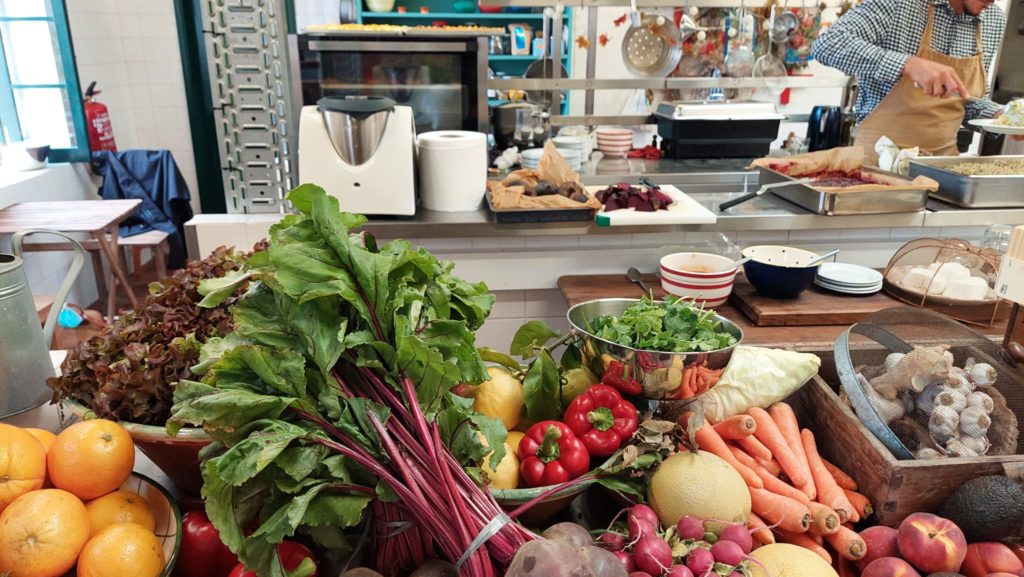
Assortment of fresh Vegetables at A Praça Sintra (how small businesses and activists fight climate change)
Graça: I think it is the quality of the product, as well as the good cooks we have, I am sure it is. Because people always tell us it tastes very good. And that is because they are seasonal and locally produced. I buy no fresh products from the supermarket. Never. So this is definitely one of the secrets of this place I think.
EFH: What would you say are the major impacts of vegetarianism on the climate?
Graça: Apart from what everyone knows about, like the gasses from cows and such, the way that animals are grown. Genetic manipulation and such (GMO). Most of the food these animals have is made out of this genetically manipulated corn and soya. This is terrible because it destroys the diversity of plants. It is not good for your health either. The way these animals are raised, and the conditions they have to endure in mass production.
EFH: What would be your tip to anyone that is struggling to become vegetarian?
Graça: There is no reason for a struggle to be vegetarian. It is an idea in your mind because you were raised eating meat. But it is not difficult to cook and eat vegetarian food. You just have to have a bit of imagination. Maybe buy some books. And then you earn the pleasure of doing it. I get much happier now cooking vegetables, I wouldn’t get the same pleasure from cooking meat or fish anymore. There is no struggle around it, I think. You also do not have to become a vegetarian, you can have meat once a week for example. Also buy local and organic meat if you do eat meat.
EFH: What would you like to improve about the place?
Graça: If I had more time I would like to serve breakfast, I have been asked a few times before if I do serve breakfast as well. If there could be a way of having someone who helps with serving breakfast I would do it. I think breakfast is really important. And I feel like young people are forgetting this. I could do it, I have the space and ability. Maybe one of these days I will do it. Let me see. When I talk about this it’s possible, later it becomes more difficult.
EFH: Is there anything you would like to share with the readers?
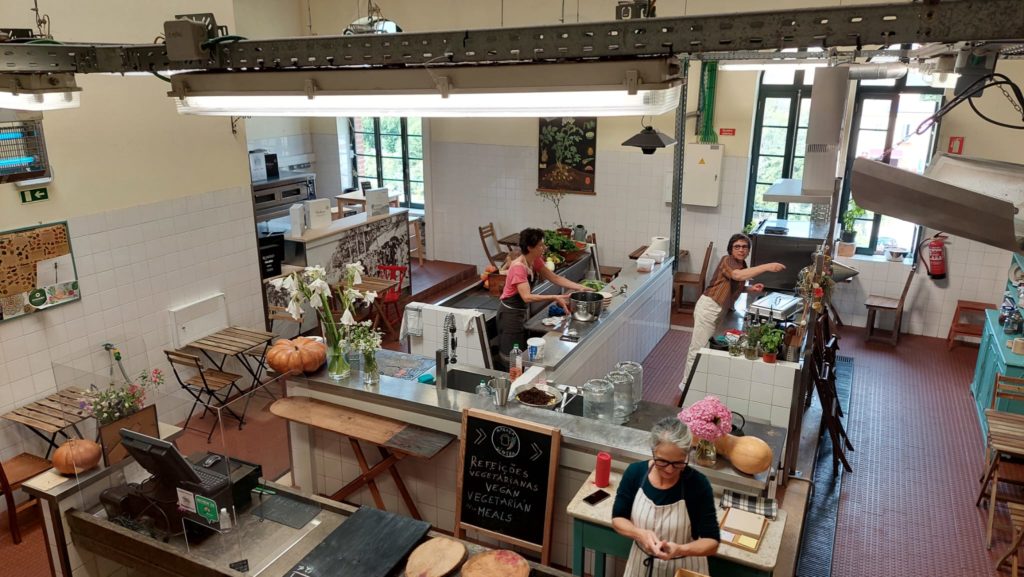
Graça and her friends in the Kitchen/Dining Area at A praça Sintra (how small businesses and activists fight climate change)
Graca: I would like to thank my friends and companions in the kitchen, first of all. I would also like to say that I love my clients. I like them very much. And I think they are happy here. And I would like to thank them because they are part of all of this. It is not just the staff and me. But it´s the clients, they come every week. I have got clients that come every day. Every day to have lunch here. So this is a part of the place of course. And I am very grateful to them. Because they make me keep going. That is what I would like to say!
EFH: Thank you for the interview, Graça! I learned a lot from your experience.
Klimadashboard (David Jablonski)
How small businesses and activists fight climate change.
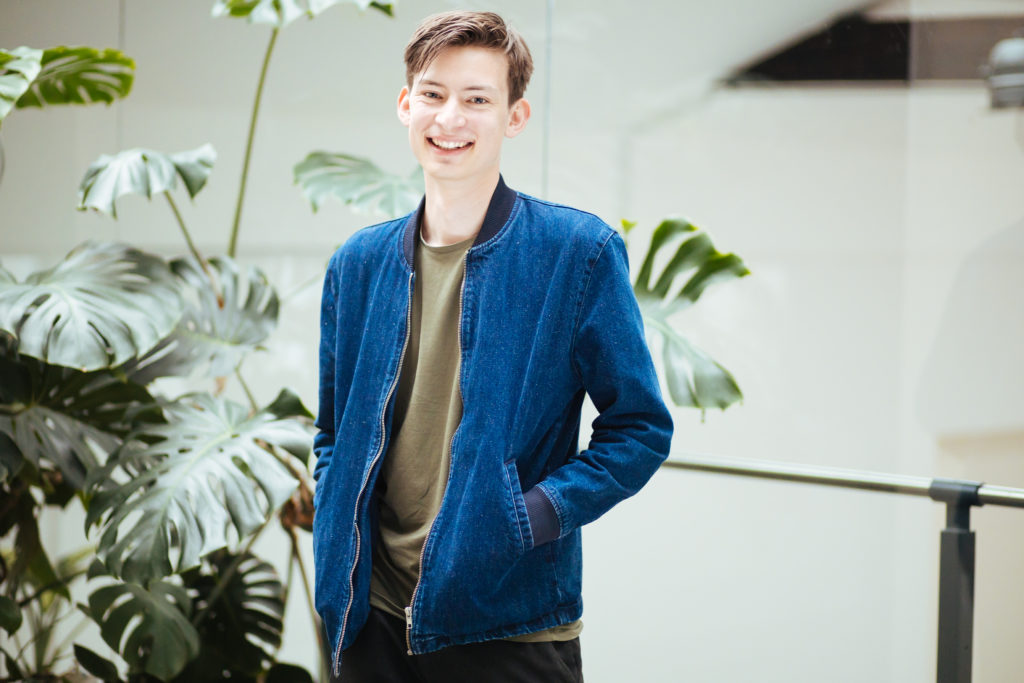
David Jablonski, founding member of Klimadashboard.at, picture taken by: Stefanie Freynschlag.
David Jablonski is a young designer based in Austria. He is passionate about Interrailing as well as climate activism. Together with a team of people, he created the website Klimadashboard.at. He also published a very interesting storytelling video about Interrailing which is very much worth checking out! In my interview with David, we talked about the climate crisis, interrailing, as a way of sustainable travel, and more. The following interview was translated from German into English:
EFH: Could you just introduce yourself and what you are doing?
David: Yes sure, I am a 23-year-old Vienna-based freelance designer and web developer. During my studies, I did an Erasmus semester in London and Berlin, which also led me to purchase an Interrail ticket for the very first time. I find train travel to be a very enjoyable mode of transport and it´s certainly my favorite way of exploring other countries. Its environmental footprint is also lower than flying or traveling by car, which became more important to me after becoming more active with climate justice groups like Fridays For Future over two years ago now. Together with two fellow activists, we started working on what would eventually become Klimadashboard, a little over a year ago.
EFH: Can you go a bit into detail about Klimadashboard?
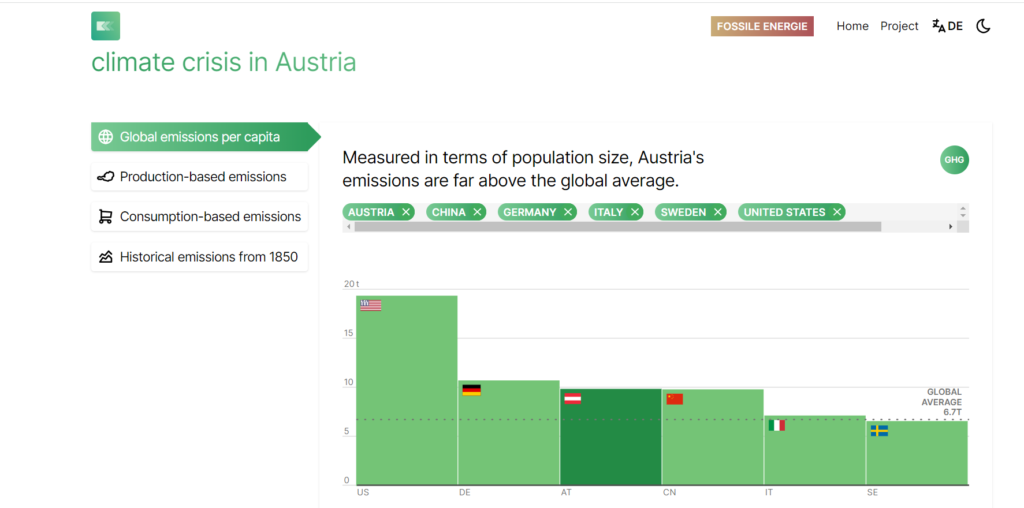
Homepage for the Klimadadhboard (how small businesses and activists fight climate change)
David: We live in a time of multiple crises, we are still in a worldwide pandemic, war is raging in Europe and the effects of the climate crisis are becoming more dramatic too. Being confronted by all these crises can be overwhelming, and it may be difficult to grasp how to move out of these crises toward a better, more peaceful, and just future for all. In the case of the climate crisis, we are often seeing quite complex scientific visualizations and language that is hard to understand for people not usually involved in the subject. Our goal is to make the climate crisis tangible by making the underlying science accessible, through easy-to-understand visualizations, simple language, and data sets that are local and always up to date.
When we talk about “saving the planet” or “solving the climate crisis”, people mean very different things. From planting a tree, when buying a product, to taking the train instead of the plane, or an actual overhaul of the entire system that led us into this crisis. In short, we are lacking a common vocabulary for the climate crisis. Europe needs to halve all emissions by 2030 to keep the goals laid out in the Paris climate accord in reach. Visualizing the challenges, impacts, and solutions for the climate crisis is what the Klimadashboard is all about.
The data shown on the dashboard comes from trusted sources only, peer-reviewed journals, and respected institutions like the Austrian environmental agency.
EFH: Would you describe the Klimadashboard as a success?
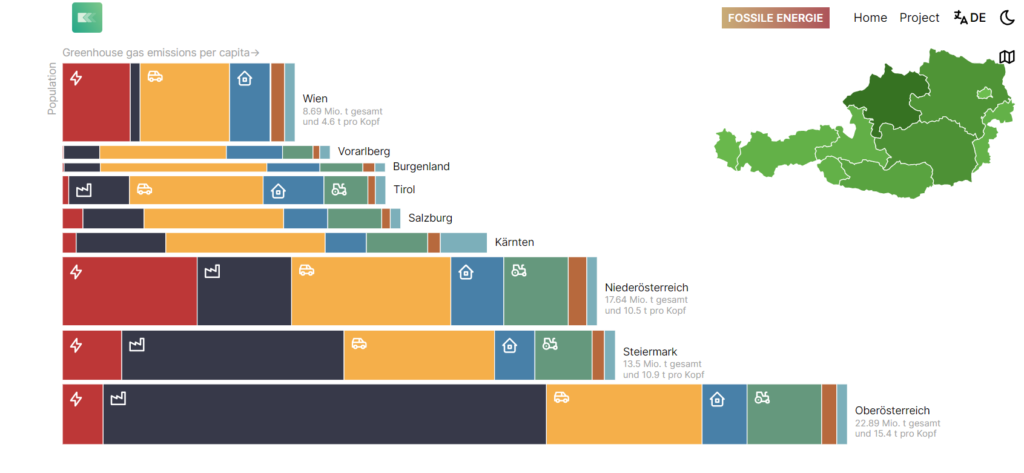
Klimadashboard Greenhouse emissions per capita July 2022 in Austria (how small businesses and activists fight climate change)
David: Our goal was and still is to reach more people with climate science, whether that is journalists, school children, or the general population. Since February, when we launched the dashboard to the public we have been featured in all major newspapers and TV channels, with our visualizations being printed on full-spread articles. Which is awesome to see honestly!
We have also received many requests from journalists, as well as scientists to visualize more datasets. So it would be fair to say that for the time that Klimadashboard has been online, it has been a success. But we, of course, are planning to do a lot more with it, like expanding it to other countries.
EFH: What does Interrailing mean to you, and also in context with other ways of traveling?
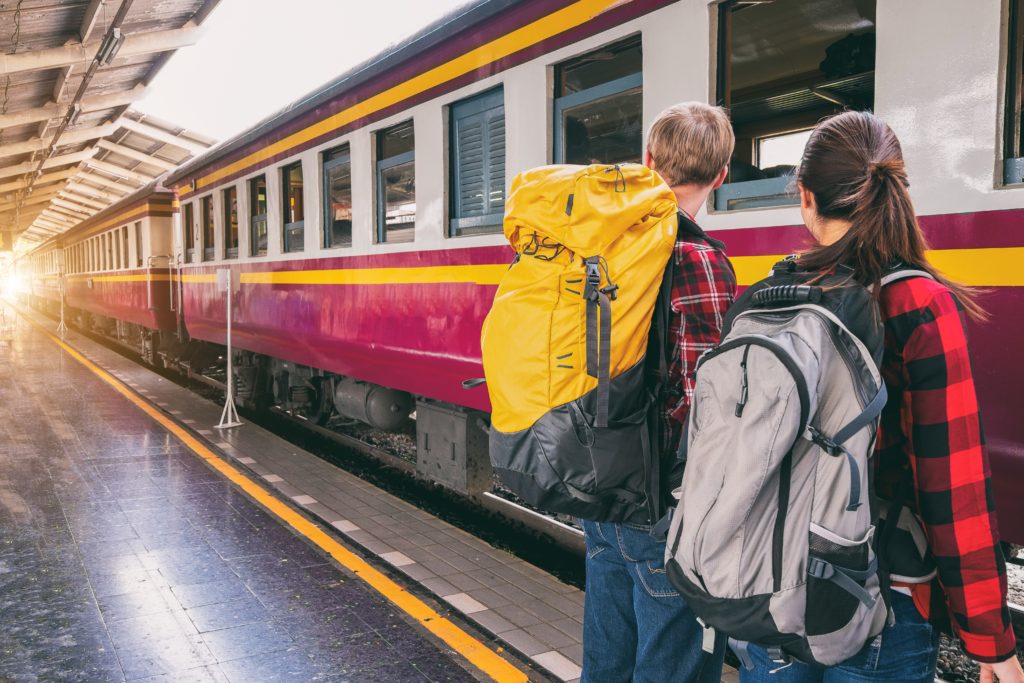
Travelers taking a train (how small businesses and activists fight climate change)
David: Interrailing and train travel, in general, provide me with a wonderful sense of freedom. I can pick my own pace, not just seeing the start and end of a journey, but rather how the landscapes, architecture, and people change on the way from one destination to the next. I could look out of train windows for hours!
You also get to be spontaneous, hopping out on the way when a city seems interesting or adapting your travel plans on-the-spot to travel with some travel friends you met while on the train.
Of course, it is not all romantic, trains get delayed, canceled, and occasional mandatory reservations decrease flexibility. But overall it is still much more enjoyable than any of the alternatives.
Especially in the last few years, I have also found myself questioning why we rely so heavily on short-distance flights in Europe. This is another major selling point for train travel to me. To be able to travel with a much lesser toll on the climate.
EFH: What be your personal tips to try and be more sustainable?
David: Living a climate neutral/climate-friendly lifestyle is always a matter of privilege. The fact that I can do an interrail trip currently is thanks to my job being location independent, but also the fact that I can afford it. This is not the case for everyone, especially given that airplane tickets are sometimes more affordable than their train counterparts, which is quite absurd given the high toll flying has on the environment.
Therefore I believe that it is extremely important that we use the political power that we have as the people. Be that through voting, protesting, or other political initiatives. If we want to have a shot at reaching net-zero within the next 18 years, political will is what matters the most, we need large-scale systemic transformations and politicians that make responsible choices. Sure, every small step counts, but let us not forget to remind the people in power of their responsibilities too.
EFH: When talking about small actions in our daily life to be sustainable, in contrast with political activism and systemic changes, is one more important than the other?
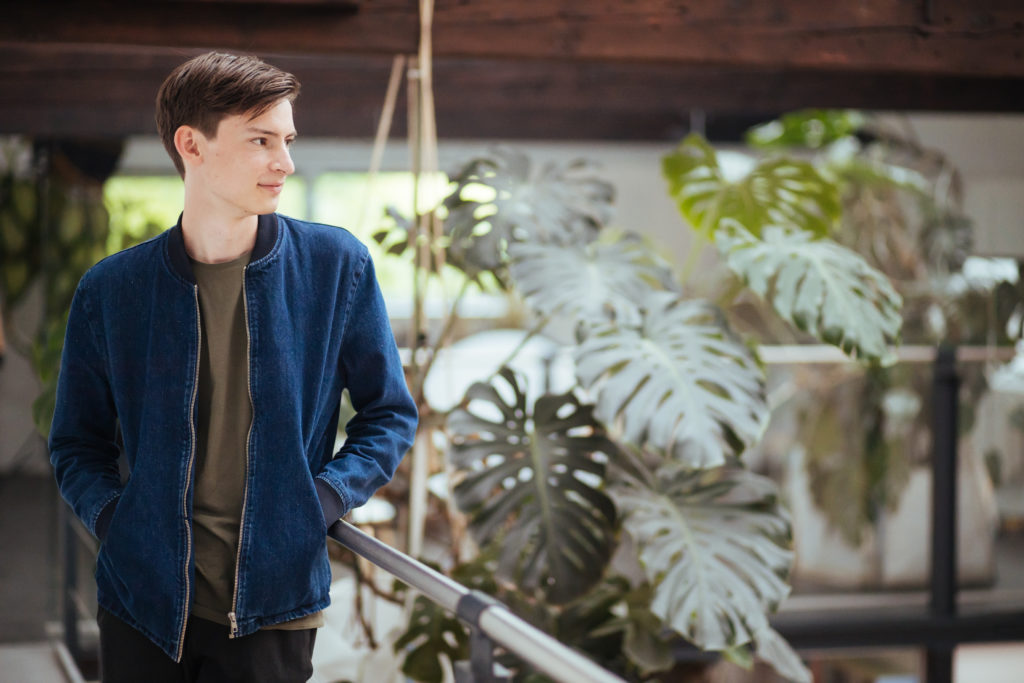
David Jablonski, Photographer: Stefanie Freynschlag (how small businesses and activists fight climate change)
David: Well it isn’t always possible to separate it, is it? However, I think it is important, that we move away from a world in which the most sustainable option whether to travel, eat, or do whatever else is the most complicated and expensive one. We should create a world, where the most sustainable option is also the easiest and cheapest. And this is not possible by individual changes in consumer habits, but rather has to be done through societal, and political change.
EFH: How would you connect being a web designer/developer with your activism?
David: Great. I actually got involved with Fridays for Future first when building a website with them. That was my pathway to climate activism. And of course, a lot of the work I do at Klimadashboard, whether design or coding, is very similar to the work I do for commercial clients.
I believe design is more than just visual communication and making things look nice. It is about making sense of the complex world around us, which we need now, more than ever, now that we are facing all of these crises at once.
When most people think of the climate crisis they often feel overwhelmed or not knowledgeable enough. My goal is to gain a deeper understanding of the crisis we are in because ultimately this is what will motivate us to change.
EFH: Thank you, David, for the Interview!
Eco-Wanderer Campaign
Not only do small businesses and activists fight climate change, but companies and associations across Europe are also trying to contribute. At Europe´s Famous hostels we are currently also leading our project for the climate, the ECO-Wanderer is a campaign that aims to motivate travelers to travel sustainably.
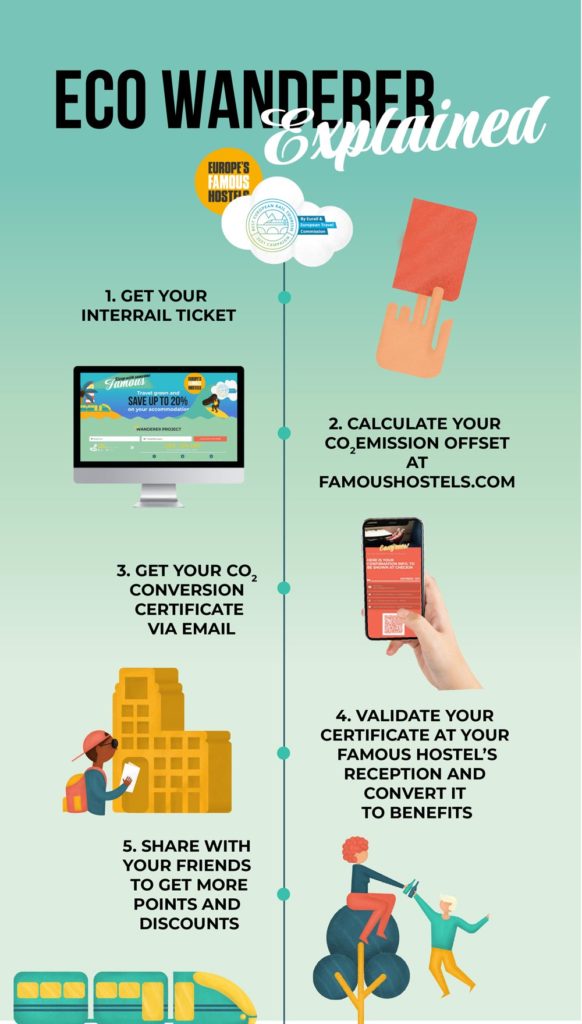
ECO-WANDERER (How small businesses and activists fight climate change)
To do this those choosing to travel using ECO-Wanderer are rewarded discounts at our hostels for the number of kilometers they traveled by traveling by train. The project is in cooperation with Interrail and aims to promote both Europe´s Famous Hostels as well as interrailing while doing something good for the climate and attempting to reduce emissions caused by plane or bus travel.
How does it work?
We developed an online calculator app, which calculates the carbon emissions produced when traveling from one destination to another, and compares its offsets if traveling by train or plane. Based on the amount produced, our visitors can receive a discount on the price of their stay at their destination hostel, thus encouraging them to get there in the most sustainable way possible to receive the best discounts.
How does the C02 Saver Calculator work?
Users enter the starting point of their journey. From here, they select any EFH destination and click on “calculate my offset”.
- Based on the Climatic App for Co2 conversions.
- The discount ratio is from 5% to 20%
- Minimum distance: 58km
- Maximum distance:1500km
Once you have your Interrail ticket, you can calculate your Co2 emission offset on our website(available from April 22 and onward). You will then get your conversion certificate via email (Qr-Code). This code can then be used to validate at a famous hostel’s reception. The validation will then convert your train kilometers into discounts/benefits. For more information follow this link!
We hope you enjoyed this article on how small businesses and activists fight climate change, and if you are looking to go on a trip, why not book your next stay through us at Europes Famous Hostels?

